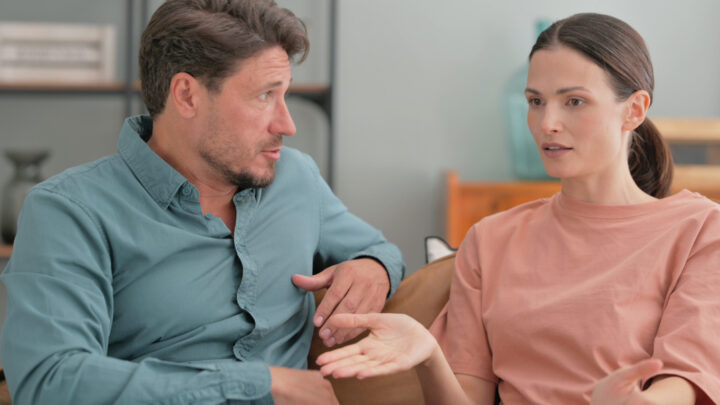If you’re constantly putting your partner’s needs before your own, making excuses for their behavior, and feeling like you’ve lost yourself in your relationship, you might be stuck in a codependent dynamic. Codependency is no joke – it’s a destructive pattern that can leave you feeling drained, resentful, and trapped. However, it doesn’t have to be like this. The first step is to recognize the signs that you’re in this toxic dynamic — then you can break free.
You’re a chronic people-pleaser.
 Source: Unsplash
Source: Unsplash
If you’re constantly bending over backwards to keep your partner happy, even at the expense of your own needs and boundaries, that’s a red flag. Healthy relationships require give and take, not self-sacrifice. Start practicing assertiveness and saying “no” when something doesn’t feel right. It may be uncomfortable at first, but learning to prioritize your own needs is crucial for breaking the cycle of codependency.
You’ve lost your sense of self.
 Source: Unsplash
Source: Unsplash
When you’re in a codependent relationship, it’s easy to lose sight of who you are outside of your partner. If you’ve given up your hobbies, friendships, and goals to focus solely on your relationship, it’s time to reconnect with yourself. Make a list of things you used to enjoy before your relationship and start incorporating them back into your life. Rediscovering your passions and identity is key to building a strong sense of self.
You’re always the fixer.
 Source: Unsplash
Source: Unsplash
If you find yourself constantly trying to solve your partner’s problems, even when they’re not asking for help, you might be stuck in a codependent pattern. It’s not your job to rescue or change your partner. Instead, focus on taking care of yourself and let your partner take responsibility for their own choices and consequences. Remember, you can support your partner without sacrificing your own well-being.
You have a hard time being alone.
 Source: Unsplash
Source: Unsplash
Codependency can make the thought of being alone feel terrifying. If you’re constantly seeking your partner’s approval and companionship, even at the expense of your own needs for solitude and self-reflection, it’s time to start building your independence. Practice spending time alone, whether it’s taking a solo trip, trying a new hobby, or simply enjoying a quiet evening at home. Learning to be comfortable in your own company is an essential step in breaking free from codependency.
You make excuses for your partner’s behavior.
 Source: Unsplash
Source: Unsplash
If you find yourself constantly defending your partner’s hurtful or irresponsible actions, both to yourself and others, that’s a sign of codependency. It’s not your job to cover for your partner or rationalize their behavior. Instead, hold them accountable and set clear boundaries around what you will and won’t tolerate in your relationship. Remember, you deserve to be treated with respect and kindness, no matter what.
You struggle with low self-esteem.
 Source: Unsplash
Source: Unsplash
Codependency and low self-esteem often go hand in hand. If you’re constantly seeking validation from your partner and basing your worth on their opinions, it’s time to start building your self-confidence from the inside out. Practice self-compassion and positive self-talk, and surround yourself with people who lift you up and support your growth. Remember, your value comes from within, not from your relationship status.
You have a fear of abandonment.
 Source: Unsplash
Source: Unsplash
If the thought of your partner leaving fills you with paralyzing fear, to the point where you’ll do anything to keep them around, that’s a clear sign of codependency. It’s important to recognize that no relationship is guaranteed, and that you have the strength to survive on your own. Start building a strong support system outside of your relationship and practice self-soothing techniques when feelings of abandonment arise.
You neglect your own needs.
 Source: Unsplash
Source: Unsplash
In a codependent relationship, your own needs often take a backseat to your partner’s. If you’re constantly putting their desires above your own basic needs for self-care, rest, and fulfillment, it’s time to reprioritize. Start setting aside non-negotiable time for activities that nourish your mind, body, and soul. Remember, taking care of yourself isn’t selfish – it’s essential for your well-being and the health of your relationship.
You struggle with trust issues.
 Source: Unsplash
Source: Unsplash
Codependency can breed a lack of trust in yourself and your partner. If you find yourself constantly questioning your partner’s motives, snooping through their phone or email, or assuming the worst about their behavior, it’s time to start rebuilding trust – both in yourself and your relationship. Practice open and honest communication with your partner, and work on developing a stronger sense of self-trust through therapy, journaling, or other self-reflection practices.
You have a hard time setting boundaries.
 Source: Unsplash
Source: Unsplash
If you struggle to say “no” to your partner or assert your own needs and desires, you might be stuck in a codependent pattern. Healthy boundaries are essential for any relationship, but they can be especially challenging for codependents. Start small by setting a few clear, specific boundaries around your time, space, and emotional energy. Practice communicating these boundaries assertively and consistently, even if it feels uncomfortable at first.
You enable your partner’s unhealthy behaviors.
 Source: Unsplash
Source: Unsplash
Codependency often involves a pattern of enabling, where you shield your partner from the consequences of their own actions. If you find yourself covering for your partner’s addiction, irresponsibility, or other destructive behaviors, it’s time to take a step back. Remember, enabling only perpetuates the cycle of codependency and prevents your partner from taking responsibility for their own growth and well-being.
You have a hard time making decisions.
 Source: Unsplash
Source: Unsplash
If you constantly defer to your partner’s opinions and struggle to make choices on your own, that’s a sign of codependency. Healthy relationships involve a balance of independence and interdependence, where both partners are capable of thinking for themselves. Start practicing decision-making in small, low-stakes situations, like choosing what to eat for dinner or how to spend your free time. As you build confidence in your own judgment, you’ll be better equipped to make bigger decisions that align with your values and goals.
You feel responsible for your partner’s happiness.
 Source: Unsplash
Source: Unsplash
If you believe that it’s your job to keep your partner happy and fulfilled, even at the expense of your own well-being, that’s a clear sign of codependency. The truth is, no one can “make” another person happy – that’s an inside job. Instead of taking on the burden of your partner’s emotions, focus on cultivating your own happiness and encouraging your partner to do the same. Remember, a truly fulfilling relationship involves two whole, happy individuals coming together to share their lives.
You avoid conflict at all costs.
 Source: Unsplash
Source: Unsplash
Codependency can make the thought of conflict feel unbearable, leading you to sweep issues under the rug or compromise your own needs to keep the peace. But healthy relationships require the ability to navigate disagreements and express differing opinions. Start practicing assertive communication and learning to tolerate discomfort in the face of conflict. Remember, avoiding issues only leads to resentment and disconnection in the long run.
You feel guilty for taking care of yourself.
 Source: Unsplash
Source: Unsplash
If the thought of putting your own needs first fills you with guilt and shame, that’s a sign of codependency. It’s easy to fall into the trap of believing that self-care is selfish, but the truth is, you can’t pour from an empty cup. Start challenging the belief that your worth is tied to how much you sacrifice for others. Practice prioritizing your own physical, emotional, and spiritual well-being, and watch how it transforms your relationship and your life.
You feel stuck and hopeless.
 Source: Unsplash
Source: Unsplash
Codependency can leave you feeling trapped in a cycle of dysfunction and despair, convinced that things will never change. But the truth is, change is possible – and it starts with you. Breaking free from codependency requires a commitment to your own growth and well-being, even when it’s hard. Seek out support from a therapist, support group, or trusted friends and family. Remember, you are not alone, and a healthier, more fulfilling life is within reach.





